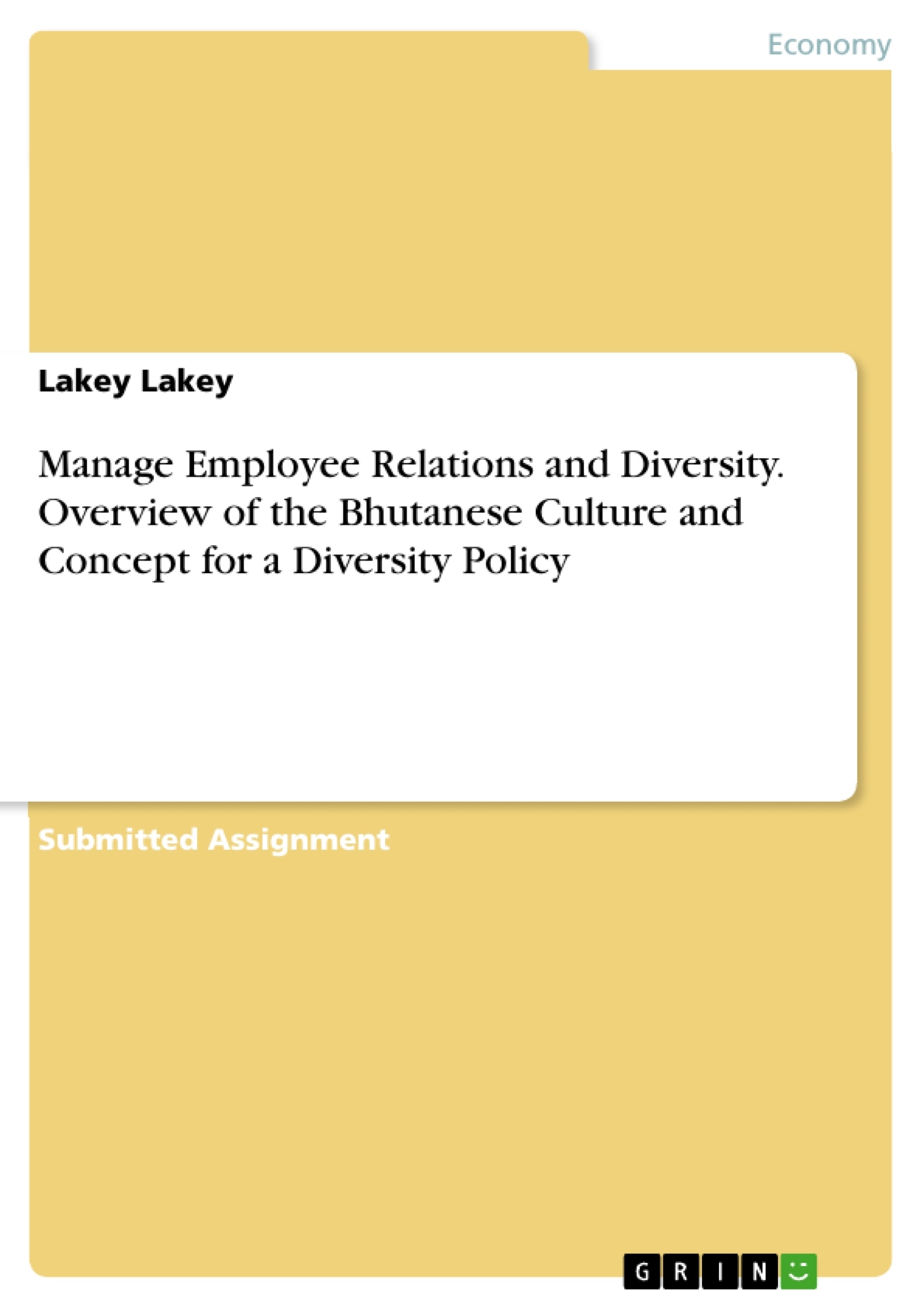This assignment includes a critical essay that provides a brief overview of a foreign culture and attempts to put it in the context of its relations and various implications in a cross-cultural working environment. The second part of the assignment develops a comprehensive Diversity Policy for Marine Deluxe, a fictional yacht building company. The policy covers important aspects like policy implementation and monitoring and evaluation plans.
Inhaltsverzeichnis (Table of Contents)
- Manage employee relations/Manage diversity policy
- Purpose of the Policy
- Scope of the Policy
- Objectives of the Policy
- Promotes equity and acknowledgement of diversity in employment, and that it is committed to providing a work environment that fosters fairness, equity, and respect for social and cultural diversity, and is free from all forms of discrimination, harassment and victimization.
- Assure recruitment and maintenance of inclusive workforce profile that does not discriminate individuals on their race, gender, cultural identity, age, religious affiliation or sexual orientation.
- Sustain proactive leadership role in promoting “unity in diversity” and diversity-led learning and development practices at the workplace as well as in the external community.
- Encourage workplace support systems for minority groups and the disadvantaged so that the environment is safe, inclusive and free from all forms of discrimination or harassment.
- Stakeholders & Stakeholder Responsibilities
- Policy Communication
- Implementation
Zielsetzung und Themenschwerpunkte (Objectives and Key Themes)
This section aims to provide an overview of Bhutanese culture and its implications in a cross-cultural work environment, specifically within the context of a Western business setting. The objective is to examine cultural differences and potential challenges that Bhutanese employees might encounter when working in a diverse environment.
- Influence of Buddhism on Bhutanese culture and values
- Importance of etiquette and respect for authority in Bhutanese society
- Cultural differences in power distance and individualism between Bhutan and Western countries
- The need for diversity management and inclusivity in the workplace
- Development of a diversity policy for a hypothetical organization, Marine Deluxe
Zusammenfassung der Kapitel (Chapter Summaries)
The initial part of the text delves into the significance of Bhutanese culture, emphasizing its strong Buddhist foundations and the central role of etiquette in daily life. The author highlights the unique approach to gender equality and the absence of rigid social structures that hinder progress. However, it acknowledges potential challenges faced by Bhutanese employees in Western work environments due to cultural differences in power distance and individualism.
The subsequent section focuses on the development of a comprehensive Employee Diversity and Inclusivity Policy for Marine Deluxe. It outlines the policy's purpose, scope, and objectives, emphasizing the promotion of equity, diversity, and inclusivity in all business operations. The section details the stakeholders involved and their responsibilities in the policy's development, implementation, and review. It also outlines communication strategies and implementation plans for the policy, including the establishment of a Diversity Interest Committee and specific targets for increasing female representation in the workforce.
Schlüsselwörter (Keywords)
The text focuses on Bhutanese culture, cross-cultural work environments, diversity management, inclusivity, employee relations, policy development, stakeholder engagement, and organizational culture. It highlights key concepts like power distance, individualism, and cultural dimensions.
Frequently Asked Questions
How does Bhutanese culture influence workplace relations?
Bhutanese culture is deeply rooted in Buddhism, which emphasizes respect for authority, etiquette, and a unique approach to gender equality, impacting how individuals interact in professional settings.
What are the main objectives of a Diversity Policy?
The main objectives are to promote equity, prevent discrimination and harassment, and ensure an inclusive workforce profile regardless of race, gender, or religious affiliation.
What is "Marine Deluxe" in this context?
Marine Deluxe is a fictional yacht building company used as a case study for the development and implementation of a comprehensive Diversity Policy.
What challenges might Bhutanese employees face in Western companies?
Challenges often stem from differences in cultural dimensions such as power distance and individualism, where Bhutanese values might clash with Western management practices.
How is a Diversity Policy implemented and monitored?
Implementation involves stakeholder communication and committees, while monitoring and evaluation plans ensure the policy's effectiveness and the achievement of specific inclusivity targets.
- Arbeit zitieren
- Lakey Lakey (Autor:in), 2017, Manage Employee Relations and Diversity. Overview of the Bhutanese Culture and Concept for a Diversity Policy, München, GRIN Verlag, https://www.grin.com/document/1184525



